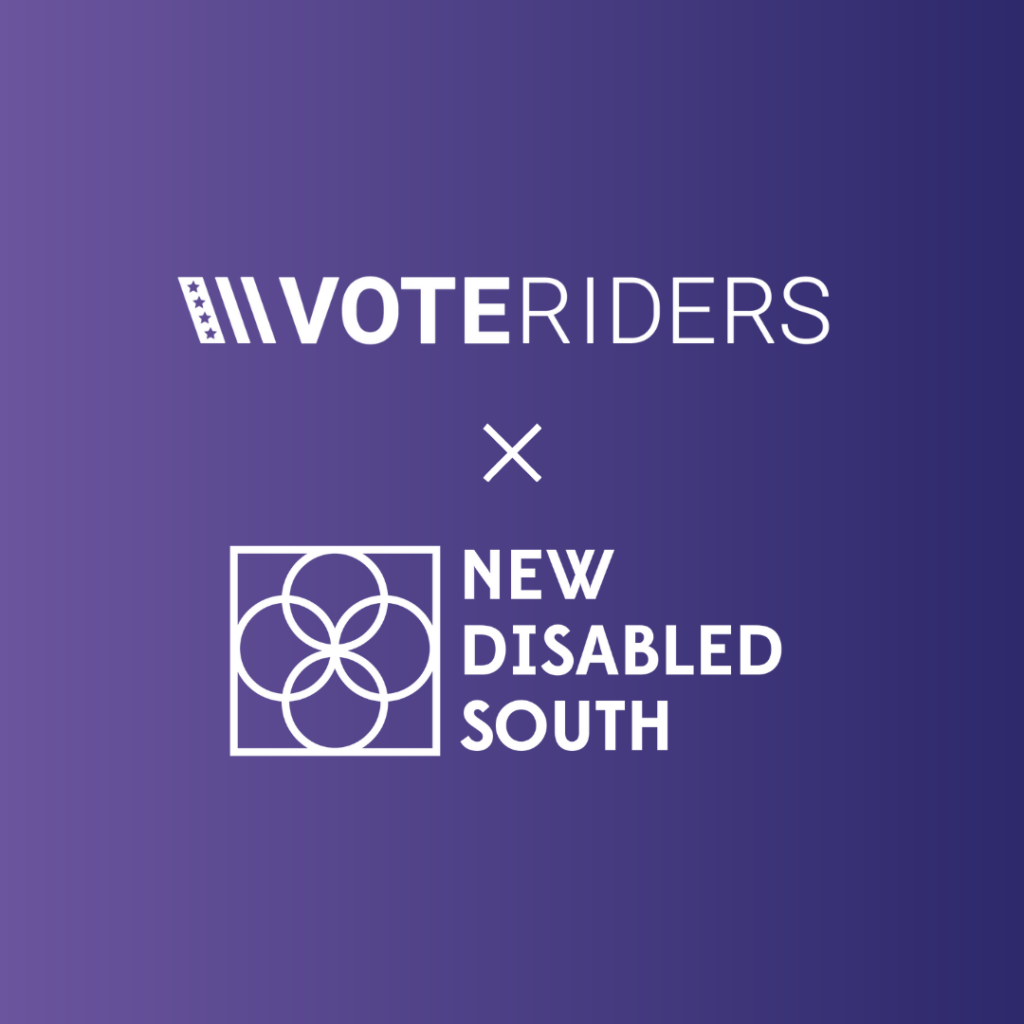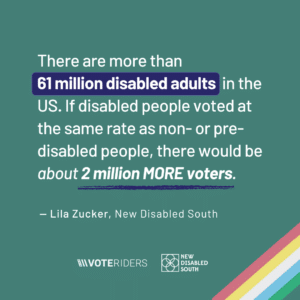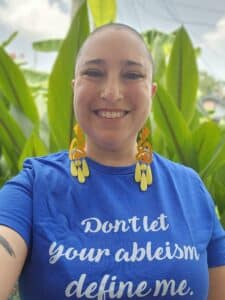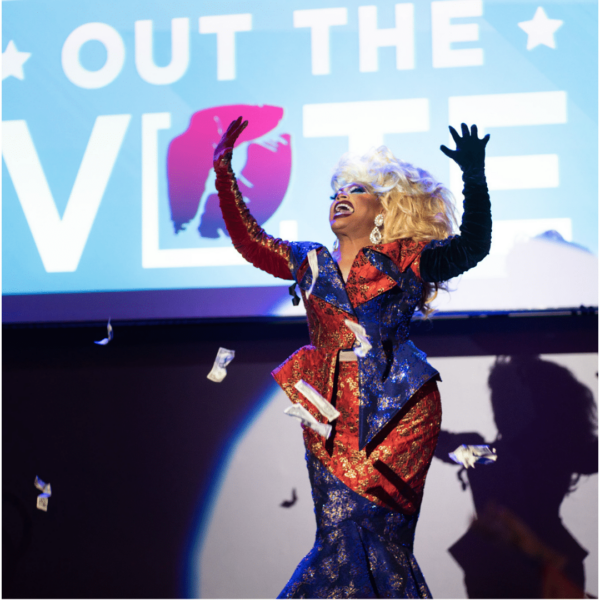
Q&A With New Disabled South’s Lila Zucker: “The ADA is the floor. Not the ceiling.”
VoteRiders Digital Communications Coordinator Erin Carden spoke with New Disabled South’s Organizing Director Lila Zucker about Disability Pride, the importance of partnership, and what it means to navigate the voting process as a disabled American. — JULY 26, 2024
Tell me about yourself and your role at New Disabled South.
My name is Lila Zucker, I use she, her, and hers pronouns. I grew up in New York City and spent most of my life in Oregon, but Louisiana has been home for 13 years. I’m a queer, disabled organizer. I have been organizing since I was in high school and have been with New Disabled South for almost a year as the Organizing Director.
My job is to help facilitate connections between disabled folks and organizations across the South to break down silos and help support the organizing that’s happening on the ground and the work that’s being done to uplift, organize, and support disabled people in our communities.
What is your organization’s mission and what are some of your key initiatives for 2024?
Our mission is to support and uplift disabled people and disabled organizing to build a strong disability justice movement and a political home for disabled folks across the Southern United States. Our vision is a South where liberation and justice for all disabled people are achievable.
We’re focusing our work on three pillars this year: voting and democracy, poverty and care, and criminalization. We do a lot of different work in a lot of different areas. We do original policy research and advocacy, and we do a lot of work around changing the narrative about what it means and looks like to be disabled. We uplift the stories and experiences of disabled people in the South to make sure more of our community hears our stories and sees us for the wonderful, complex, unique people that we are, and we do a lot of organizing—which is my department.
So many organizations are under-resourced and overextended and are often so focused on the incredible work they’re doing that they can’t connect with other groups or organizations. So we’re making an effort to break down those silos and bring folks together. Many organizations serve disabled voters but don’t focus on ensuring their work and programs are accessible. lot of what we’re doing is supporting our partner organizations— a lot of civic engagement groups — that are on the ground in our 14 Southern states to make sure they have the information and resources disabled people need to get out and vote this year. We’re also working with them to help improve the accessibility of their programs and outreach.
There are so many barriers to voting for disabled people in this country and these barriers have only been increasing in the last year. So we’re making sure people know what changes have happened in terms of access to voting and how, when, and where to vote.
 We’re also asking our partners to collect information about the disabled voters they are speaking to and share that information with us because right now there isn’t much data collected about disabled voters and it’s really important that we gather this data to improve our outreach and advocate for services.
We’re also asking our partners to collect information about the disabled voters they are speaking to and share that information with us because right now there isn’t much data collected about disabled voters and it’s really important that we gather this data to improve our outreach and advocate for services.
But, what we do know is that there are more than 61 million disabled adults in the US. If disabled people voted at the same rate as non- or pre-disabled people, there would be about 2 million more voters.
How is New Disabled South celebrating Disability Pride Month?
We’ve got several social media initiatives asking our community what Disability Pride and Disablity Joy means to them. When abled folks think about disability, it often comes with a lot of pity or a focus on the medical aspects of our disabilities.
So often we don’t get to just exist as we are. Our disabilities are a big part of our lives and oftentimes our lives are shaped by those disabilities, but we are full and complex people outside of and in addition to those disabilities.
This month (and year-round) we’re celebrating the joy and community we share. The disability community is so incredible and supportive of each other in ways that it’s sort of hard to describe. We create these cultures and communities of care, even with people we’ve never met. This is so fundamental to the disability community — so we’re really lifting that up and asking people to share what brings them joy and community.
With the anniversary of the Americans with Disabilities Act (ADA) on July 26 — which was the original idea behind Disability Pride Month — it’s also important to highlight that while the ADA is an incredible law and has done a lot of good, it is the floor, not the ceiling. We can be incredibly happy that we have the ADA and also emphasize that this is just a fraction of what’s needed and just the beginning of the conversation.
What are some of the key issues driving voters in your community to the polls this year?
I want to acknowledge that disabled people are the largest minority in this country and the only minority group that people can join at any time.
Many disabled people exist, live, and navigate life at the crossroads of multiple marginalized identities. We don’t leave our different identities, existences, or experiences behind because we are disabled.

Again, I’m a queer cisgender woman — but I’m also disabled. I don’t leave my queerness behind when I run into barriers at the doctor, or when I can’t access my neighborhood because there are unpaved sidewalks or streets. I also don’t leave my disability behind when I want to participate in Pride or other queer community events – many of which are often incredibly inaccessible.
While there are certainly issues that are specific and key for a lot of disabled voters, every single issue is a disability issue because we exist in every community. Disabled folks are not a monolith. Our community is made up of people who claim the identity of being disabled, and then other people in the community might not say they’re disabled but they do have chronic conditions or things that would be considered disabilities, but they don’t claim that identity. Whether you were born with your disability, acquired it later in life; whether it’s a visible, invisible, or dynamic disability; whether you have a diagnosis, are struggling to get a diagnosis, don’t want or don’t have a diagnosis; all disabilities are valid and are a part of this community. So that’s a really important and unique quality about our community that doesn’t get talked about enough.
That being said, healthcare, especially Home Community Based Services (HCBS) waivers are a huge concern for our community. These services allow disabled people with a variety of different disabilities to receive support to live in their community so they don’t have to live in institutions. The waitlists for these waivers can be 10+ years in many states.
The problem is that there is a distinct lack of funding for those waivers and the workers who provide those services are paid at incredibly low rates. It’s a really hard but really important job and yet many of these workers are receiving wages that are so low, they aren’t able to take care of their own families. Some of the other issues that are front of mind for our community this year are housing access & affordability, employment (including subminimum wages for disabled workers), voting access, criminalization of disability & the criminal legal system, and environmental justice & disaster preparedness. Bodily autonomy (and within that, reproductive rights and justice) is also a big issue for disabled individuals and it’s something that people don’t think of as a disability issue but it absolutely is — and this is something we need to talk about more.
What do you say to voters who feel their vote doesn’t matter?
There are a lot of people who feel that their vote doesn’t matter and unfortunately, it can be really easy to feel this way because so often we feel like we are asked to vote all the time and vote for people who don’t completely reflect our values or what we believe is important in this country. A lot of people feel let down by our political systems, especially disabled folks in the United States. We often feel ignored and disregarded by not just elected officials but also by a lot of campaigns and political parties. Dozens of different disability organizations around the country submitted a letter requesting that the presidential debate at the end of June be made accessible by having an American Sign Language Interpreter, among other demands, but there was no response and that debate was not made accessible for us. So, I think it’s really easy to feel like your vote doesn’t matter and it’s really important to recognize that is a valid feeling and it makes sense that people are frustrated or don’t feel that voting is important.
With that said, I think an important way of thinking about voting is that it’s harm reduction. Writer and activist Rebecca Solnit once wrote in a piece published in The Nation in 2016:
“I think of voting as a chess move, not a Valentine.”
I think that’s a really important way of thinking about voting. Voting is important because there are so many things in this country that are only decided and implemented by the people who are in elected office, whether that’s the condition of our roads and our sidewalks, how much public transportation we have in our city, the quality of our public schools, access to health care, whether or not we have reproductive freedom, or whether or not our communities are getting destroyed by giant corporations.
We can’t ignore elections, but I think it’s also important to think of elections as a starting point. Election Day is very important, but there is so much organizing that has to happen before and after Election Day too.
We need to vote so we have people in power who are thinking about us, considering us, and making decisions that ensure our communities have access to the services and support they need to not just survive, also to thrive.
A single vote can make a huge difference. So many elections are really close. Even just one vote can determine the winner of an election or what kind of measures are passed. When we don’t vote, that doesn’t necessarily send a clear message to those in power about why we’re not voting. If we’re dissatisfied with our elected officials or our political system, we need to fight to change them. Sometimes we fight to tear down systems and build new ones from scratch, but we have to vote so that our elected officials know what we care about and the direction that we would like our communities to go. Then we also need to show up and make sure they’re hearing from us.
Voter ID laws are one example of barriers that disproportionately impact disabled voters. What are some of the other barriers disabled voters face when it comes to voting? Where are these barriers most prominent?
According to the ADA, all polling places are required to be accessible and have minimum levels of accessibility, but only 17% of polling places in the US are truly accessible.
This means that disabled voters who have done everything they need to do in order to vote — they struggled to get their ID and arranged for a ride to their ID-issuing office — show up to their polling place and they cannot get in. They are unable to vote. Or, maybe they’re able to get into their polling place but they need to use an accessible voting machine. Many times these machines don’t work or they aren’t available at that polling location. Most often, poll workers haven’t received adequate training on how to set up accessible voting machines or how to assist disabled voters with using various voting accommodations.
In addition to those in-person architectural barriers, in the last few years, several states have passed signature match laws that require ballot signatures to be checked closely.
For many disabled voters, this law completely bars them from voting. As a personal example, depending on my physical mobility and how much my various conditions are flaring up and affecting me, my handwriting and signature can change dramatically from hour to hour. Somebody checking ballot signatures may not know that, and by relying on that method, a lot of disabled voters either aren’t able to vote or have their votes discounted.
There are also a lot of barriers to voting by mail, which is often a method that is much more accessible to many disabled folks. In a lot of states, especially in the South, and especially in our region, there have been a lot of efforts over the last few years to make voting by mail harder for voters, which disproportionately impacts disabled voters because voting by mail can be much more accessible than voting in-person. In several states, voting in person is the only option. Other states have restrictions on who is eligible to vote-by-mail. For example, in many states, you have to reveal medical information and provide proof from your doctor that you’re “disabled enough” to qualify to receive a vote-by-mail ballot.
Also, ballots are oftentimes inaccessible for people with print, physical, or visual disabilities. In the last couple of years, there have been a lot of restrictions that have been proposed — and in some cases passed — to limit the amount and type of support that voters can receive with requesting, completing, and returning their vote-by-mail ballot.
Both Alabama and Louisiana recently passed laws that severely limit what type of assistance a person with a disability can receive in requesting, completing, and returning their mail-in ballot. These laws say that only an immediate family member can help you do that, but there are so many people in this country who don’t have immediate families nearby.
Many disabled people live in congregate settings — various institutions like group homes, state hospitals, or nursing homes — and the staff there oftentimes help the disabled residents vote-by-mail. Some of these recent restrictions make it so that staff who are paid to assist disabled people, are only able to assist one individual with their absentee ballot. But if you live in a congregate setting, oftentimes the staff are supporting multiple individuals there, and so the ratio of staff to disabled voters is not one-to-one which means many disabled voters won’t receive that assistance at all.
There is absolutely no reasonable reason for these restrictions aside from limiting voting access. There are many reasons why people need assistance with voting and it shouldn’t be up to our elected officials to determine whether or not somebody deserves to receive the support they need to participate in our democracy.
I could talk about the barriers disabled voters face for a long time, but I’ll stop there.
What is New Disabled South doing to address these barriers? At VoteRiders, we offer voter ID resources tailored to disabled voters and a range of free services to help people get the ID and/or underlying documents they need to vote. For example, we offer free rides to and from ID-issuing offices for folks who are unable or cannot easily travel to these locations. We also partner with thousands of organizations, including New Disabled South, to bring voter ID information and assistance to folks across the country. How is New Disabled South working with VoteRiders to make sure disabled voters have the ID they need to cast a ballot?
We adore VoteRiders and the work that y’all do. Your work is so essential. Not enough people know how hard it can be to navigate voter ID laws and figure out what you need to vote and how to get it. There are so many barriers to getting an ID that so many folks don’t think about so I just want to say how much we appreciate VoteRiders’ work and your partnerships with New Disabled South and so many other incredible organizations. These partnerships are so important and they show us that we have to work together to help folks overcome voting hurdles.
We’re connecting our partners in our Southern Disability Justice Coalition and various other folks we work with all across the country to VoteRiders. We’re making sure they have access to your Voter ID Information Cards and your free trainings so when they’re out talking to folks in the community, they’re sharing all of this valuable information and spreading the word about your free resources. This includes going into congregate settings to visit with folks and make sure they have the ID they need to vote this year and have VoteRiders’ free Helpline number (866-432-8683) in case they have questions or need free voter ID support.
One of the other things we’re doing in partnership with VoteRiders — in Georgia, North Carolina, and a couple of other states in our region — is acquiring a broader understanding of the logistical and administrative barriers disabled voters might encounter with getting their IDs that may be different from non-disabled voters. For example, physically getting around and navigating a lot of in-person travel to various ID-issuing offices is something disabled folks deal with every single day.
Having to navigate those hurdles on top of navigating your existence as a disabled person can be so difficult. Getting an ID, especially if you don’t have some of the required paperwork — like a birth certificate or Social Security card — can be so difficult that it just doesn’t seem worth it to try because we’re just trying to deal with existing. But with groups like VoteRiders, we’re able to help people navigate these burdens and lower these barriers, which makes a huge difference.
It’s also important to us that we support the VoteRiders staff, volunteers, and community to make sure you understand these different dynamics and are connected to other organizations and resources that are doing great work with the disabled community in case you ever get questions from disabled voters about things unrelated to voter ID. We have to take different pieces of the puzzle and put them together by supporting each other.
This interview has been edited for length and clarity.


